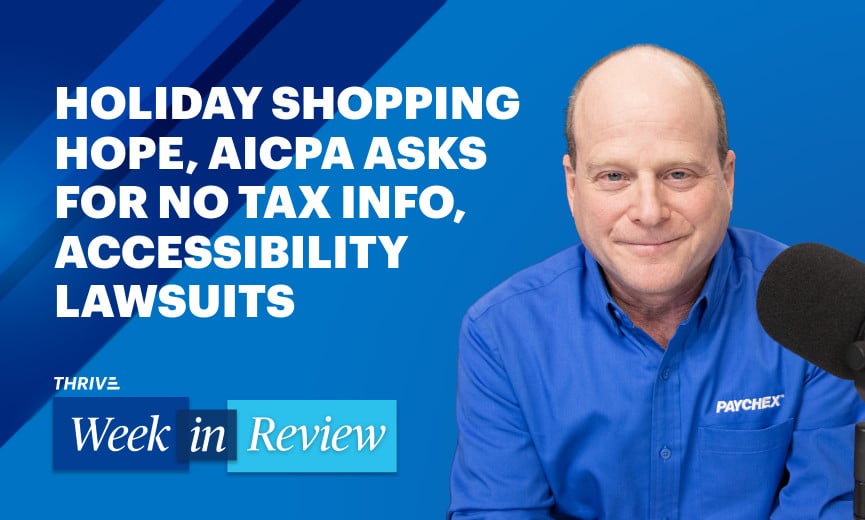- Thrive
-
Season
4Episode72
Threads vs. Twitter, Small Business Borrowing, and UPS Strike Threat

Podcast •

Summary
In this episode of "The Week in Review," Gene Marks dives into three key news topics affecting small businesses. He explores the potential impact of "Threads," Facebook's latest platform, as a potential Twitter competitor and shares insights on selecting the best social media platform for individual businesses. Gene then delves into a research report on small business borrowing, revealing surprising stability in bank lending rates despite soaring credit card interest rates. He discusses how businesses are accessing capital in this environment and speculates on future borrowing trends. Lastly, Gene highlights the looming UPS strike and advises businesses to prepare for potential supply chain disruptions and higher shipping costs. Tune in for valuable insights to navigate these challenges effectively.
View Transcript
Hey, everybody, this is Gene Marks, and welcome to another episode of the Week in Review, a THRIVE podcast from Paychex. Thank you so much for joining me. As you guys know, this is the weekly podcast that I do where I take a few items out of the news that impacts your small business and talk a little bit about them.
So, let's get right to the news. The first bit of news is Threads. Have you heard of it? Hopefully you have at this point, it was just introduced last week. In fact, it was launched by Facebook through its sister company, obviously own company, Instagram. Threads is supposed to be the Twitter killer. It is Facebook's answer or Meta (that's the parent company of Facebook and Instagram and Threads).
It is their answer to Twitter. Threads received almost 100 million sign ups in just the first few days after launching. It became one of the fastest growing platforms in history. So a lot of people have a lot of interest in it, and people are wondering if that could be a big issue for Elon Musk's Twitter. Now, this impacts your business.
You know, it impacts my business as well. Why? Because a lot of us are active on social media. Now on my business, I have two social media platforms and I'm primarily active on; LinkedIn, which I actually think is the best for business to business companies and Twitter. And I'm active on Twitter mainly because I do a lot of, you know, I have a lot of people in the media and people that are friends of mine and other business owners that I stay in contact with there.
So is Threads a threat to me? I don't really consider it to be. First of all, I've actually been quite happy with Twitter since Elon Musk took over. I've found the performance to be fine and the amount of bots to be going down and it's actually been okay with me and my community is there. But that doesn't mean that plenty of other businesses like yours might not be impacted or have a real interest in being active on Threads.
The reason why is because your community. If you're big on Instagram, Facebook too, but primarily Instagram and you're generating business from there, you built up a community of, you know, people that are like minded to you on Instagram, Threads is a natural extension of it where you can get on and have the same kinds of chats and communications and back and forth that hopefully with a little bit less, you know, antagonistic stuff than you might see on Twitter.
So to me it is all about where your community is. My audience, my community, my customers right now are on LinkedIn and Twitter, so I don't have any plans to move to Threads yet. But you should consider it yourself if you think if more of, you know, that your community is on Facebook and Instagram and you can engage even more with your customers and potential customers.
So, if you think there could be you, definitely look into Threads. It's free, so take advantage of it. It might be a better answer for you than Twitter.
The next piece of news has to do with a research report that came out about small business borrowing. And the good news is, according to the National Federation of Independent Businesses and a few other reports that came out found that even though credit card interest rates are higher, significantly higher than they were a year and a half ago, most of the people that they surveyed at the NFIB, as well as another firm called Biz to credit, have found that bank lending rates have remained pretty consistent, meaning, that if you're a small or mid-sized business and you're looking for capital, the capital is there from traditional loans, which is good. According to Biz to credit, small banks got an 18.8% approval of loans in June, which was actually up 1/10 of a percentage point from May, marking the first increase since January. And the rate at big banks that are approving loans also held steady, which ended 11 straight monthly declines.
That kind of flies in the face not only of what I thought would happen, what I'm seeing happen at some of my clients listen interest rates are the average prime rate across the country is between 8.25 and 8.5%, significantly higher than what it was just a year, year and a half ago. And I have been seeing some of my clients really second guess whether or not they want more financing or not.
I am concerned that banks are going to be tightening credit not because capital isn't available. There really is quite a lot of capital out there thanks to the Fed's, you know, pretty expansive balance sheets, but really more so that banks might be less willing to take risks on small and mid-sized companies because of the higher cost of interest, makes it a higher debt maintenance cost and if a bank doesn't, the bank doesn’t want to loan money out to somebody that they're not going to get paid back. The bottom line is that the numbers are holding steady, which is good news. And what that tells me is that the businesses that are out there looking for loans are not only sound enough, but they're reasons for getting this capital, whether it's to buy inventory, property and equipment are backed up by good return on investment analysis.
And I think it's showing that banks are comfortable with that. And I think that businesses, even in this higher interest rate environment, are still comfortable borrowing. And to me, I think that's really good news. I don't believe that that's going to continue. I really do believe that the high cost of borrowing in the high interest costs for facing now, which are going to continue for at least another 6 to 12 months, is going to have an impact on businesses borrowing, not just on the availability of credit, but just the cost of doing so.
It's going to make it more costly and people are going to be double thinking what their what they're getting financing for. But right now it's holding steady. That is good news for now. But just keep a close eye on that going forward into the future.
And finally, there is a looming strike by UPS, the delivery company, that could really have an impact on your business and many other businesses around the country.
Reuters report just late last week is reporting that roughly 340,000 workers at UPS, this is the world's biggest package delivery firm, are threatening to delay millions of shipments, which could create all sorts of supply chain issues and send shipping rates higher. Talks between the unions at UPS and management are deadlocked right now, and there is a deadline date of July 31st.
That's when the current contract expires. So if the UPS workers go on strike at the end of this month, that will have an enormous impact on all of the companies, including yours and mine, that depend on UPS to deliver our products. So, if you are reliant on UPS, my advice to you now is to line up some alternatives and get ready to pay a little bit more for shipping costs, because there's certainly going to be a bigger demand at some of those competitors.
Talk to those competitors now. Make sure that there's freedom for you to move there. Be prepared for a potential strike that could come at the end of July.
My name is Gene Marks, and you've been listening to this week's “Week in Review” podcast from Paychex THRIVE. Thanks so much for joining us. If you've got any suggestions or would like to suggest even a guest for the podcast, our normal THRIVE podcast, please visit us at Payx.me/thrivetopics.
In the meantime, I'll be back with you next week with a few items in the news that impact your business and some thoughts on those items. Thanks for listening. We will see you then.
This podcast is Property of Paychex, Inc. 2023. All rights reserved.

 Apple Podcast
Apple Podcast Spotify
Spotify iHeartRadio
iHeartRadio








